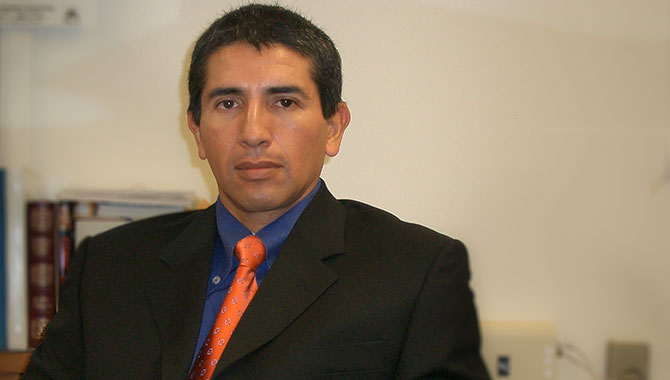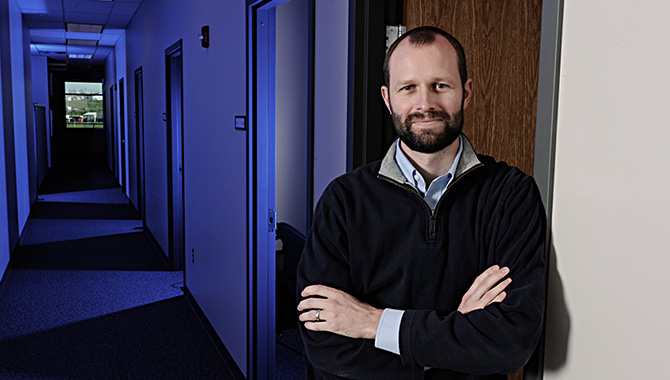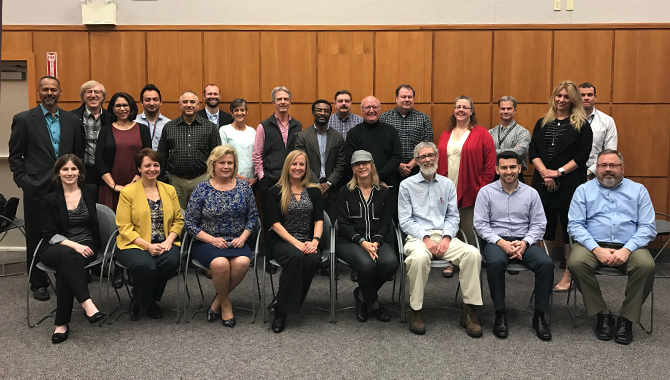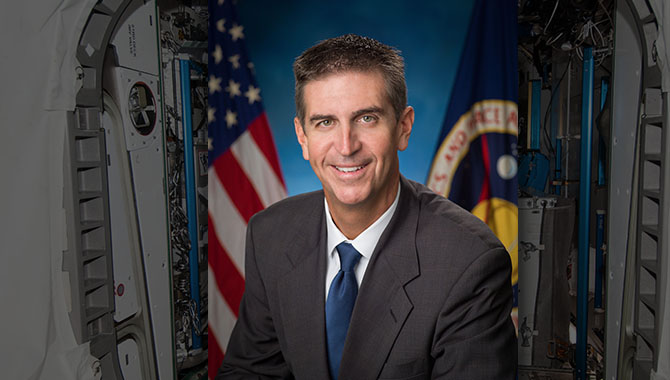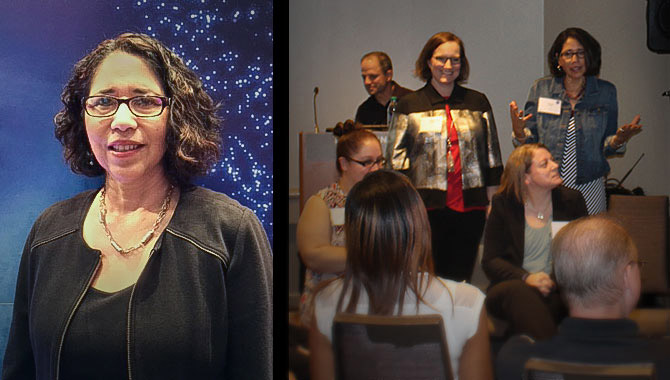
Barbara Trujillo, NASA Procurement Knowledge Services Lead. Trujillo, right, collaborates with Procurement team members Jim Becker, left, Jenny Arkinson, Rachel Jandron, left (seated), and Tracy Hall.
Photo Credit: NASA
Barbara Trujillo discusses knowledge sharing in NASA’s Office of Procurement.
Disclaimer: This material is being kept online for historical purposes. Though accurate at the time of publication, it is no longer being updated. The page may contain outdated information or broken links. Current Knowledge Community Corner articles are available here.
Barbara Trujillo, a Procurement Analyst at NASA Headquarters Office of Procurement, is NASA Procurement’s Knowledge Services Lead. Trujillo works with the acquisition and procurement community to ensure they have the information and tools needed to successfully complete their mission effectively and efficiently. Prior to joining NASA in 2015, she spent 23 years as a Department of Defense contracting professional supporting the Army Signal Corp with engineering, information technology, communications, and satellite requirements; supporting the broad spectrum of acquisition programs; and developing contract policy at the Army Headquarters, Assistant Secretary of the Army (Acquisition, Logistics and Technology) Procurement office. Most recently, she worked for the Office of Secretary of Defense (Acquisition, Technology and Logistics), Defense Procurement and Acquisition Policy, Contingency Contracting developing contract policy and procurement tools in support of emergency procurement and military operations overseas. She holds a Bachelors of Accountancy from New Mexico State University.
As part of a comprehensive assessment of business functions across NASA, Trujillo has actively facilitated collaboration and knowledge sharing to implement a Business Services Assessment (BSA) “deep dive” team’s recommendations to enhance procurement processes and practices across the agency.
Do you have a team of people supporting the knowledge services function in Procurement?
We’ve developed a team where we have procurement reps from each NASA center because knowledge management really happens at the operational level. We need to include the operational level to determine the right solution. They know what they have. They know what they need. So it’s been great to have the team.
What really brought our knowledge management team together was the BSA deep dive. Knowledge management was occurring throughout the agency, but now it can be more formalized. We went to Procurement at each center to identify a representative to help us standardize and set up a knowledge management strategy that would be enduring across the agency, not just to check a box for the BSA. These are generally the center Procurement policy chiefs. They’re already basically touching everything — looking at the new laws coming in, new regulations and how they affect everybody, and information to release to the contracting officers and specialists so they know what to do and the training they need — so they’re really the hub of information.
Are there any successful knowledge efforts in your organization that you’d like to highlight?
I think we’re being successful because Procurement representatives at NASA centers have a common goal to share procurement and contracting knowledge across the agency. Each center has a niche they have created, but there are some good examples. Goddard has done several case studies from a procurement perspective, so they have a good model working with Ed Rogers. Johnson does a lot of instructional videos. Langley has developed a separate portal for their technical customers in regards to training them on how to put a requirements package together. Stennis has taken a fun approach and created a Jeopardy-style game to help people get the “contracting 101” knowledge they need. There have been a lot of neat initiatives, but if you don’t highlight them and make sure other people know, then you’re only supporting the local group — which is good — but then we need to look at how to use this across the agency and help people to share knowledge.
What do you see as an example of tangible benefits of knowledge sharing?
I think from a procurement perspective, knowledge sharing is very process-oriented. If you have it mapped right, you can almost just follow the process to know what to do. I think the benefit is that we’re more efficient and more effective in how we execute contracts.
Would you describe your knowledge management and services strategy as formal or informal?
I would say right now it’s informal, but we’re trying to formalize it. Not so much that it hinders people, but it really should enhance what people then have access to. Formalizing shouldn’t make it more cumbersome. It should make it easier. We’re moving in a direction to formalize it, but not to a point where the structure is so rigid that people don’t want to do it. That’s the idea behind bringing representatives from all the NASA centers. They’re all part of the solution, and they’re shaping it and saying, ‘This is how we’re going to formalize knowledge management.’
What are the biggest challenges to knowledge sharing that impact your organization?
It’s figuring out exactly everything we have as far as all the information that’s on different procurement-related websites — and what it is that we wish we had — and then building a platform to enable a single repository. This is the first big step in building ways to connect everybody to each other and their information. If you go to some place and after a while you can’t find what you want, and you don’t know who to go to for help with finding the information, then you may just stop looking. We don’t want that to happen. For instance, if it’s something you’re buying and you’ve never done it before, we want you to be able to find someone who’s done it before or to be able to learn about special regulations that may apply to what you’re buying. Sometimes it’s not that easy to figure out.
It’s important to think strategically in terms of what needs to be done and how much to do. I think starting out very baseline and then building upon that can help with the cultural change and getting people to start coming to the repository that we’re building. And then that’s the other challenge: getting the resources to help us build the repository, which will primarily be for NASA and industry.
I think one of the bigger hurdles is not just reaching out to Procurement, but getting the communication to cross over to our customers. The technical side could be better informed about procurement and contracting. It happens requirement-by-requirement — and we’re looking at how we can be more effective in the communication around requirements and understanding of the process. We have good relationships in NASA. It’s always about how can we make it better, what are we missing, and what do people need.
What’s the biggest misunderstanding that people have about knowledge?
What to do with it and how I can share it with others.
If someone has knowledge or an expertise, they may assume everyone has the same knowledge and can complete a task or action or solve a challenge. However, if their process or knowledge is not documented or shared with others, there is no gain or efficiency or knowledge transfer. I don’t think it’s because people don’t want to share information, but rather, an assumption that all of our experiences and lessons are the same. In reality, an individual may possess a unique knowledge or lesson that could be shared and, ultimately, help a colleague or the organization be more successful or add efficiencies. Sharing knowledge in a more formal manner, such as ongoing training, document repositories, web-based tools and documented procedures, is one of the approaches that help us across the agency.






